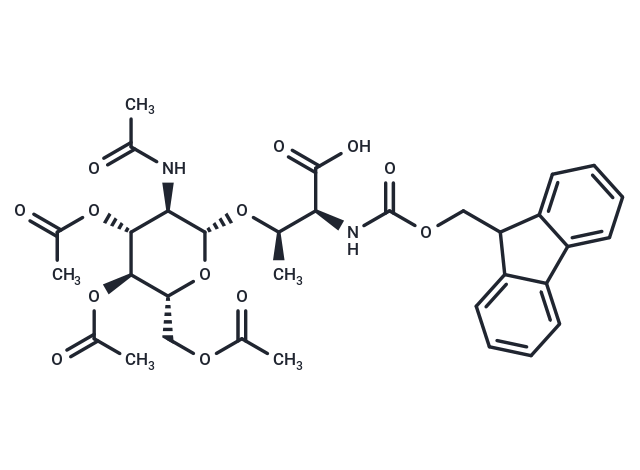 您的购物车当前为空
您的购物车当前为空
FMOC-L-THR
一键复制产品信息FMOC-L-THR (AZP-531) is an analogue of unacylated ghrelin designed to improve glycaemic control and reduce weight. The O-glycosidic linkage and the O-acetyl protection in this building block is stable to both piperidine and TFA, making it completely compatible with standard protocols in Fmoc solid phase peptide synthesis. The Tn antigen is a tumor-associated carbohydrate antigen that is not normally expressed in peripheral tissues or blood cells. Expression of this antigen, which is found in a majority of human carcinomas of all types, arises from a blockage in the normal O-glycosylation pathway in which glycans are extended from the common precursor GalNAcα1-O-Ser/Thr (Tn +antigen)[1].

FMOC-L-THR
一键复制产品信息FMOC-L-THR (AZP-531) is an analogue of unacylated ghrelin designed to improve glycaemic control and reduce weight. The O-glycosidic linkage and the O-acetyl protection in this building block is stable to both piperidine and TFA, making it completely compatible with standard protocols in Fmoc solid phase peptide synthesis. The Tn antigen is a tumor-associated carbohydrate antigen that is not normally expressed in peripheral tissues or blood cells. Expression of this antigen, which is found in a majority of human carcinomas of all types, arises from a blockage in the normal O-glycosylation pathway in which glycans are extended from the common precursor GalNAcα1-O-Ser/Thr (Tn +antigen)[1].
| 规格 | 价格 | 库存 | 数量 |
|---|---|---|---|
| 100 mg | ¥ 12,795 | 5日内发货 |
FMOC-L-THR 相关产品
产品介绍
| 产品描述 | FMOC-L-THR (AZP-531) is an analogue of unacylated ghrelin designed to improve glycaemic control and reduce weight. The O-glycosidic linkage and the O-acetyl protection in this building block is stable to both piperidine and TFA, making it completely compatible with standard protocols in Fmoc solid phase peptide synthesis. The Tn antigen is a tumor-associated carbohydrate antigen that is not normally expressed in peripheral tissues or blood cells. Expression of this antigen, which is found in a majority of human carcinomas of all types, arises from a blockage in the normal O-glycosylation pathway in which glycans are extended from the common precursor GalNAcα1-O-Ser/Thr (Tn +antigen)[1]. |
| 分子量 | 670.668 |
| 分子式 | C33H38N2O13 |
| CAS No. | 160168-40-1 |
| 存储 | Powder: -20°C for 3 years | In solvent: -80°C for 1 year | Shipping with blue ice/Shipping at ambient temperature. |





 还可以
还可以

 |
|
评论内容